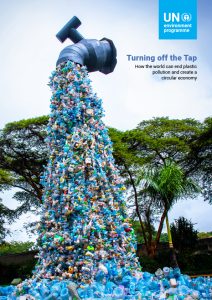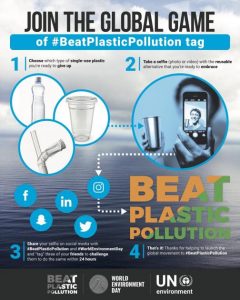
World Environment Day (WED) is an annual event celebrated on June 5th which raises awareness of environmental issues and encourages people across the globe to take action to protect our shared environment. The United Nations (UN) General Assembly designated June 5th as World Environment Day in 1972, marking the first day of the Stockholm Conference on the Human Environment. That same day, they adopted another resolution creating the United Nations Environment Programme (UNEP). UNEP coordinated the first celebration of WED in 1973, and it has led celebrations ever since. This year’s theme is #BeatPlasticPollution, shining a light on this worldwide issue (see past themes at https://www.worldenvironmentday.global/about/history). This year’s host country is Côte d’Ivoire in partnership with the Netherlands. Since 2014, Côte d’Ivoire has banned the use of plastic bags, supporting a shift to reusable packaging, and the country’s largest city, Abidjan, has also become a hub for environmentally minded start-ups.
As described in a previous post, plastics, including micro- and nanoplastics, are ubiquitous in our environment, even leaking from plastic recycling facilities. Microplastics are found in a variety of organisms, including humans. Recognizing the need for action, the U.S. Environmental Protection Agency released a draft National Strategy to Prevent Plastic Pollution in April and is seeking public comment through June 16, 2023.
On its WED website, UNEP provides a Beat Plastic Pollution Practical Guide, with recommendations for individuals; non-governmental organizations, faith organizations, and community groups; science and education organizations; governments; cities, towns, and local authorities; investors; and businesses and industry. The guide outlines how plastic pollution affects us, the sources of plastic pollution, what progress is being made, and what more needs to be done to address the situation.
 The WED website also links to an interactive lesson on the plastic pollution problem and the UNEP report, Turning off the Tap: How the world can end plastic pollution and create a circular economy, which was released on May 16, 2023. This report examines the economic and business models needed to address the impacts of the plastics economy. UNEP suggests “a systems change to address the causes of plastic pollution, combining reducing problematic and unnecessary plastic use with a market transformation towards circularity in plastics. This can be achieved by accelerating three key shifts – reuse, recycle, and reorient and diversify – and actions to deal with the legacy of plastic pollution.” They explain that “reorient and diversify” “refers to shifting the market towards sustainable plastic alternatives, which will require a shift in consumer demand, regulatory frameworks and costs.”
The WED website also links to an interactive lesson on the plastic pollution problem and the UNEP report, Turning off the Tap: How the world can end plastic pollution and create a circular economy, which was released on May 16, 2023. This report examines the economic and business models needed to address the impacts of the plastics economy. UNEP suggests “a systems change to address the causes of plastic pollution, combining reducing problematic and unnecessary plastic use with a market transformation towards circularity in plastics. This can be achieved by accelerating three key shifts – reuse, recycle, and reorient and diversify – and actions to deal with the legacy of plastic pollution.” They explain that “reorient and diversify” “refers to shifting the market towards sustainable plastic alternatives, which will require a shift in consumer demand, regulatory frameworks and costs.”
Finally, the WED site provides relevant news, updates related to this year’s celebration, an opportunity to register your organization’s relevant events or activities, and links to other UNEP reports related to the global plastic pollution problem.
What strategies do you use to reduce plastic consumption and pollution? Share your thoughts on social media this June 5th with the hashtag #BeatPlasticPollution. You can connect with UNEP on Facebook, Twitter, LinkedIn, or Instagram.
Learn More
- NRDC: 10 Ways to Reduce Plastic Pollution
- WWF: Tips to reduce your plastic waste
- Beyond Plastics
- Plastic Pollution Coaition
- 5Gyres


